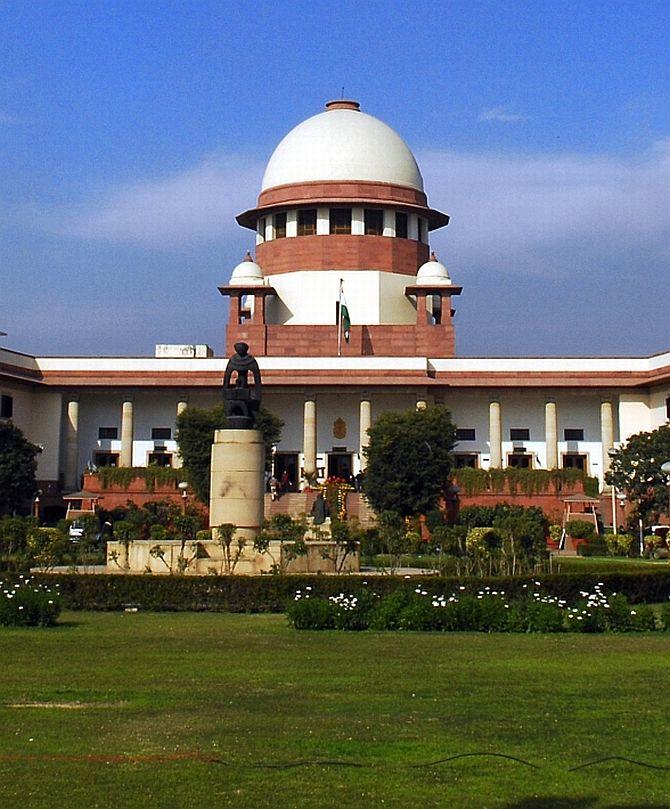In 1954, a bench of eight Supreme Court judges declared that the Constitution-makers did not recognise the Fundamental Right to Privacy. It is hoped that a larger bench as and when constituted will uphold the Right to Privacy as a Fundamental Right, overruling the 1954 decision, says the distinguished lawyer, P P Rao.

The Right to Privacy means the right to be let alone; the right of a person to be free from unwarranted publicity and the right to live without undue interference by the government or any private individual in matters with which the public is not concerned.
Every person would like to enjoy the right to intimate personal relationships and activities including conversation without any interference. However, the Right to Privacy, like the freedom of the press, is not an expressly guaranteed Fundamental Right in the Constitution. The freedom of the press has been read into the Right to Freedom of Speech and Expression guaranteed to citizens by Article 19 (1) (a) from the inception.
Unfortunately, in 1954, a bench of eight judges of the Supreme Court declared that the Constitution-makers did not recognise the Fundamental Right to Privacy, analogous to the American Fourth Amendment and the said right cannot be imported into the Constitution by some process of strained construction.
The American Constitution declares that the right of the people to be secure in their persons, houses, papers and effects against unreasonable searches and seizures, shall not be violated and no warrant shall issue without disclosing the cause, place, person or things to be searched. In Kharak Singh's case (1964), a bench of seven judges reiterated that the Right of Privacy is not a Fundamental Right under our Constitution.
However, subsequently, starting with Govind v State of Madhya Pradesh (1975), benches of smaller strength have consistently recognised the Right of Privacy as implicit in the Right to Life and Personal Liberty guaranteed by Article 21 of the Constitution.
The interpretation of Article 21 has undergone a sea change since the first decision of a Constitution bench of six judges in A K Gopal's case in 1950.
In 1978, a bench of seven judges in Maneka Gandhi v Union of India relying on R C Cooper v Union of India (11 judges) reinterpreted Article 21 broadly and declared that the expression 'personal liberty' in Article 21 is of the widest amplitude and it covers a variety of rights which go to constitute the personal liberty of man and some of them have been made distinct fundamental rights in Article 19.
Recently, it was debated before a bench of three judges in the Supreme Court whether the judgments pronounced recognising the Right of Privacy laid down the correct law or the earlier larger bench decision in M P Sharma's case which declared that the Constitution makers did not recognise the Fundamental Right to Privacy is correct. The bench has since referred this question to a larger bench. An authoritative pronouncement of law is awaited.
Though the Supreme Court is technically right in referring the question to a larger bench, a better option would have been to declare that the view taken by the eight-judges bench in 1954 was per incurium as it did not consider in depth various other aspects of Article 21 which came to be discovered and considered in subsequent decisions by smaller benches, relying on the changed interpretation of Article 21 in R C Cooper's case and Maneka Gandhi's case.
In the United Kingdom, Article 8 of the Human Rights Act, 1998, declares that everyone has the right to respect for his private and family life, his home and his correspondence. There shall be no interference by a public authority with the exercise of this right except such as is in accordance with the law and is necessary in a democratic society in the interests of national security, public safety or the economic well-being of the country, for the prevention of disorder or crime, for the protection of health or morals, or for the protection of the rights and freedom of others.
Article 12 of the Universal Declaration of Human Rights states that no one shall be subjected to arbitrary interference with his privacy, family, home or correspondence, nor to attacks upon his honour and reputation. Everyone has the right to the protection of the law against such interference or attacks. Article 17 of the International Covenant on Civil and Political Rights, 1966 reiterates the same right.
India is a party to both the Universal Declaration of Human Rights and the International Covenant on Civil and Political Rights and is duty bound to give effect to them by suitable legislation.
In Visakha v State of Rajasthan (1997), the Supreme Court relied on international conventions for interpreting the fundamental rights conferred by Articles 21 and 14 of the Constitution, namely, the right to dignity and equality.
In India, the Code of Criminal Procedure provides for issuance of search warrants by a court in certain situations in order to unearth crimes and bring the offenders to book subject to certain restrictions. Section 144 empowers a magistrate to prevent or remedy nuisance by issuing orders and enforcing them. This power is exercised generally in the case of public nuisance suffered by individuals collectively.
Telephone tapping and interception of messages is prohibited by Section 5(2) of the Indian Telegraph Act, 1885 except when it is authorised by the central government or a state government in a public emergency or in interests of public safety, sovereignty and integrity of India, security of the State, friendly relations with foreign States or public order or for preventing incitement to the commission of an offence, for reasons to be recorded in writing.
To this extent, the Right of Privacy is recognised by the Telegraph Act. Anyone who violates this provision is liable to be punished with imprisonment up to three years or with fine or both.
In civil law, the law of torts makes infringement of Right of Privacy without legal sanction actionable in a court of law. The victim of invasion of the Right of Privacy can claim damages from the wrong doer. The common law recognises private nuisance as an actionable wrong if it interferes with a person's use and enjoyment of immovable property or some right in respect of it. Thus, irrespective of the fact whether the Right of Privacy is a recognised Fundamental Right in the Constitution or not, both civil and criminal law recognise and give effect to the Right of Privacy to some extent.
In the case of conflict of interest between Right of Privacy and public interest, the Right of Privacy must yield to overriding public interest. For example the private life of a person either moral or immoral is not the concern of another individual, but the illicit relationship of a person with another person holding public office which interferes with the discharge of duties of the office, cannot be permitted in the name of privacy.
In the UK, then minister John Profumo, who was having an affair with Christine Keeler, who was also close to a Soviet agent, had to resign. When then Pakistan president Ayub Khan on his visit to the UK was photographed while swimming with Keeler, questions were raised about the propriety of his conduct because of concerns of security.
The Right of Privacy, like all other basic human rights, is not absolute, but subject to reasonable restrictions.
It is important to note that the fundamental rights conferred by the Constitution of India are enforceable only against the 'State' -- governments or local authorities or government corporations, public sector undertakings and other institutions under the control of a government, administratively, functionally and financially, but not against private individuals.
In other words, if a person indulges in eavesdropping by listening to a conversation between his neighbour and his wife in their bedroom, the aggrieved person cannot obtain a writ from the Supreme Court or the high court against his neighbour. He may go to a civil court for an injunction restraining the neighbour from doing so.
I am hopeful and confident that the larger bench as and when constituted will uphold the Right to Privacy as a Fundamental Right, overruling the 1954 decision of eight judges.
P P Rao is a senior Supreme Court lawyer.
REDIFF RECOMMENDS










